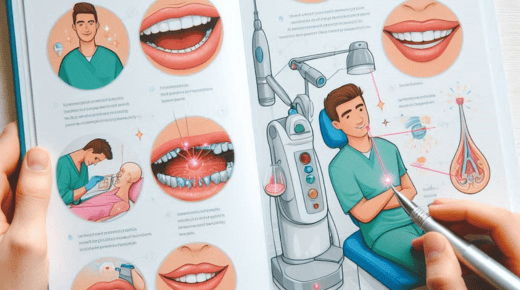Geographic tongue, also known as benign migratory glossitis, is a harmless and temporary condition characterized by the appearance of irregular, smooth, and red patches on the tongue’s surface. These patches can shift locations, giving the tongue a map-like appearance, hence the name “geographic” tongue. It may develop due to several causes and risk factors. The geographic tongue usually resolves on its own, but severe forms require prompt treatment by the dentist in Springfield, VA. Let’s explore this oral pathology further.
What causes geographic tongue?
Causes and risk factors of geographic tongue include the following:
- Hormonal changes: Fluctuations during menstruation, pregnancy, or menopause
- Stress: Physical or emotional stress can trigger or exacerbate the condition
- Vitamin deficiencies: Lack of vitamin B12, iron, or zinc
- Allergies: Sensitivity to certain foods, substances, or environmental factors
- Genetic predisposition: Family history of geographic tongue or other oral conditions
- Oral hygiene: Poor oral hygiene habits or gum disease
- Smoking: Smoking or using tobacco products
- Aging: Geographic tongue is more common in older adults
- Medical conditions: Certain conditions like anemia, diabetes, or eczema
- Medications: Reactions to certain medications, such as antibiotics or NSAIDs
- Food and drink: Consuming spicy, acidic, or sharp foods and drinks
- Environmental Factors: Exposure to irritants like pollution, dust, or chemicals
Risk factors:
- Family history of geographic tongue
- Previous episodes of geographic tongue
- Presence of other oral conditions (e.g., oral thrush)
- Weakened immune system
- Poor diet or nutritional deficiencies
- Increased stress levels
- Hormonal fluctuations
- Certain medical conditions (e.g., anemia, diabetes)
What are the symptoms of geographic tongue?
Common symptoms of geographic tongue include:
- Red, smooth, and irregular patches on the tongue’s surface
- Patches can vary in size, shape, and color (from pink to red)
- Patches can shift locations over time, giving the tongue a “map-like” appearance
- Burning or sore sensation on the tongue
- Discomfort or pain when eating, speaking, or drinking
- Sensitivity to spicy, acidic, or sharp foods and drinks
- The tongue may feel tender or swollen
- Difficulty tasting or experiencing altered taste
- Increased sensitivity to temperature changes
- White or yellowish borders around the red patches (in some cases)
Less common symptoms include:
- Swollen or inflamed tongue
- Cracks or fissures on the tongue’s surface
- Bleeding or ulceration (rarely)
- Difficulty swallowing
- Bad breath (halitosis)
- The tongue may feel dry or coated
- Numbness or tingling sensations on the tongue
How do dentists treat geographic tongues?
The geographic tongue usually resolves on its own, but some treatments can help manage symptoms. Treatment options include:
- Self-care:
- Maintain good oral hygiene
- Avoid spicy, acidic, or sharp foods and drinks
- Use a soft-bristled toothbrush
- Avoid tobacco and alcohol
- Topical anesthetics:
- Benzocaine or lidocaine to reduce pain and discomfort
- Antihistamines:
- To relieve itching and burning sensations
- Anti-inflammatory medications:
- To reduce redness and swelling
- Vitamin supplements:
- Vitamin B12, iron, or zinc to address deficiencies
- Antibiotics:
- If secondary bacterial infections occur
- Antifungal medications:
- If oral thrush develops
- Pain relief:
- Over-the-counter pain relievers like acetaminophen or ibuprofen
- Oral rinses:
- Saltwater or antibacterial rinses to reduce inflammation
- Professional treatment:
- Dental cleanings and examinations to monitor progress
Some effective home remedies to manage symptoms of geographic tongue
- Aloe vera gel to soothe the tongue
- Honey for its antibacterial and anti-inflammatory properties
- Yogurt with live cultures to promote oral health
- Turmeric or ginger for anti-inflammatory effects
- Avoiding irritants like citrus fruits or spicy foods
Bottom line
Geographic tongue is a benign and temporary condition that can cause discomfort and self-consciousness. While its exact cause is unknown, various factors can contribute to its development. With proper diagnosis and management, symptoms can be alleviated, and the condition can resolve on its own. If you suspect you have a geographic tongue, consult a healthcare professional for guidance and support.




